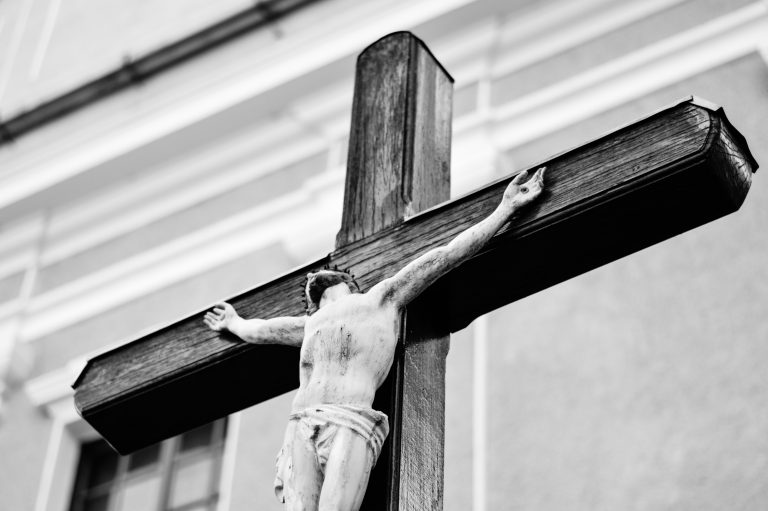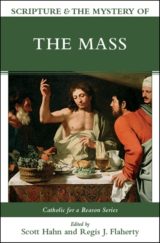By Jeff Cavins
Jeff Cavins is a public speaker, author, and Holy Land Pilgrimage leader helping Catholics better understand their faith. Of his many projects, he contributed to the Catholic for a Reason series from Emmaus Road Publishing.

Pope John Paul II said, “Down through the centuries and generations it has been seen that in suffering there is concealed a particular power that draws a person interiorly close to Christ, a special grace.”
How many times have you heard someone say, “The Mass is boring,” or “What does the Mass have to do with my situation in life?” How many of us have grown up not understanding that in the Mass we have the divine drama of sacrificial love presented to us with the invitation to participate in the ultimate act of love? Unfortunately, for some, the Mass becomes a duty of time where images, scents, responses, and movements swirl about to make up what we call religion.
The most ironic thing about many people’s experience during Mass is that they have brought their problems, their suffering, and their preoccupations to the very place where their suffering can find true meaning. Why is it that we oftentimes review our life’s difficulties in our minds, completely missing the very drama that changes the question mark in our hearts to an exclamation mark? Like the dehydrated man circling a drinking fountain contemplating how thirsty he is, so today, many Catholics are circling the Mass with thoughts of their own predicament.
Christ’s suffering can transform our lives in the Mass. Every time we go to Mass, we should be struck by the fact that God has come to earth, suffered, died, and now asks us to follow in His footsteps. At the end of every Mass, we must leave with the attitude: Not only am I going to join myself to Him in His sacrifice, but I’m also going to live that sacrifice when I exit the door and go to my home, my work, and my neighbors. In short, I’m going to become like Jesus in every area of my life.
Often our lives are spent trying to avoid suffering. We don’t like to suffer, and most of us have unanswered questions about suffering. Especially, we wonder how God, if He loves us, could allow us to suffer. The gospel message provides answers to the question of suffering, but those answers may not be readily apparent. Throughout salvation history, we see that the ways of God are often not the ways of man. Embedded in the dark confines of an oyster, we find, to our surprise, shining pearls. Perhaps the circumstances in which you find yourself appear to be dark and hopeless. But know: you are not alone. Not only have others been where you are, but more importantly, Jesus has been where you are.
As we survey human history, it becomes evident that it’s not “if” we are going to suffer during our lives, but “when,” and, more importantly, “how” will we suffer—poorly or well? Once the Holy Sacrifice of the Mass is understood, it will become the key to suffering well, rather than loosing hope in life. There is meaning in suffering that can change your sorrow into joy. I know—I’ve been there and have, like many others, been transformed as a result of understanding the message of the Mass.
When there is no meaning attached to suffering, people can easily fall into despair. However, once meaning is attached to suffering, it is astounding what people can endure. The key is not the suffering, but the meaning attached to it. Most would agree that they would not be willing to endure great agony for six months for a mouse, because they don’t see any meaning in their suffering for a mouse. But most would enthusiastically raise their hands in affirmation if I were to ask, “How many of you would be willing to endure pain for your daughter or your son?” They would raise their hands because they would find meaning, namely the life of their child.
The key to understanding suffering is found in the life, death, and Resurrection of Jesus Christ. When asked, “Why did Jesus come to earth?” the answer is usually, “He came to die for my sins.” While this is true, there must be more—for if He only came to die then why wouldn’t He have accepted death as an infant? He was fully God as an infant, so why not offer Himself shortly after being born? As we will see, the mission of Jesus involves more than simply dying. It involves a complete identification with humanity, including suffering. We will also see that our mission in life constitutes more than merely going to church every week. We are called to not only attend Mass, but to completely identify with Christ by joining our lives to His.
You Might Also Like
From Genesis to Revelation, Scripture and the Mystery of the Mass explores the biblical roots of the Mass and the practical ways in which the mystery of the Eucharist affects our everyday lives. This volume includes essays by prominent Catholic scholars and apologists such as Scott Hahn, Jeff Cavins, Tim Gray, Kimberly Hahn, Curtis Martin, Edward Sri, Michael Barber, and others.
